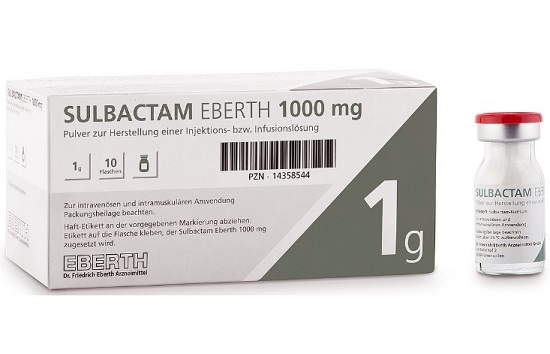Thailand Medical Study Finds High Dose of Sulbactam with Colistin Lowers Mortality in Deadly Pneumonia
Nikhil Prasad Fact checked by:Thailand Medical News Team Nov 13, 2024 1 year, 3 months, 1 week, 3 days, 20 hours, 50 minutes ago
Thailand Medical:
Background on Thailand’s Battle Against CRAB
A new Thailand medical study has shown promising results for patients suffering from drug-resistant pneumonia caused by the difficult-to-treat bacteria, Acinetobacter baumannii. This bacterium, notorious for its ability to resist antibiotics, has been classified as a critical health threat due to its rapid evolution of drug resistance. The research team, comprised of specialists from Phramongkutklao Hospital in Bangkok and the Department of Microbiology at the same institution, focused on tackling carbapenem-resistant Acinetobacter baumannii (CRAB) infections in a critical healthcare setting.
 Thailand Medical Study Finds High Dose of Sulbactam with Colistin Lowers Mortality in Deadly Pneumonia
Thailand Medical Study Finds High Dose of Sulbactam with Colistin Lowers Mortality in Deadly Pneumonia
In this
Thailand Medical news report, we break down findings from this randomized, controlled trial, which compared two dosages of sulbactam - a powerful antibiotic - when used in combination with colistin. The goal? To determine whether higher doses of sulbactam could better control mortality rates in pneumonia patients in the intensive care unit (ICU) facing CRAB.
Study Design and Participants
The study was conducted at Phramongkutklao Hospital in Bangkok, a large facility where many of Thailand’s sickest patients receive care. Researchers recruited 138 patients aged 18 and above with either hospital-acquired pneumonia (HAP) or ventilator-associated pneumonia (VAP), both caused by CRAB. Each of these patients was randomly assigned to receive one of two sulbactam doses: either 9 grams or 12 grams daily, both in combination with colistin. Participants in the trial were closely monitored for 28 days to assess the effectiveness and safety of these treatment regimens.
Key Findings on Mortality Rates
One of the primary objectives of this study was to determine if the higher dose of sulbactam (12 g/day) would reduce the 28-day mortality rate compared to the 9 g/day dosage. The study observed a promising trend: while patients on the 9 g/day regimen experienced a mortality rate of 59.4%, those receiving the higher dose showed a lower rate at 47.8%. This reduction in mortality was even more significant after adjusting for critical factors such as underlying health conditions and disease severity, with the adjusted hazard ratio demonstrating a 46% decrease in mortality risk for those on the 12 g/day dose.
Microbiological Cure Rate and Treatment Response
In addition to mortality, the study also looked at how effectively each dose could eliminate the bacteria from patients' lungs - a crucial factor in reducing relapse. Researchers found that microbiological cure rates were significantly higher in the 12 g/day group (89.4%) compared to the 9 g/day group (73.2%), suggesting that a higher dose of sulbactam is more effective in treating CRAB pneumonia. This finding supports the recommendation for combined therapy, as the researchers observed improved bacteriological outcomes with colistin and sulbactam together than with sulbactam alone.
&a
mp;nbsp;
ICU and Hospital Stays
Surprisingly, the improvement in mortality rates did not correlate with shorter ICU stays or faster weaning from mechanical ventilation. Both treatment groups showed similar lengths of ICU and hospital stays. This suggests that, while a higher sulbactam dose can help reduce mortality, the nature and severity of CRAB infections often require extended care, particularly for survivors of such severe infections.
Understanding the Mechanism: Why 12 Grams Might Work Better
The study highlights the importance of adequate dosing when fighting drug-resistant bacteria like CRAB. Previous research has suggested that only a high sulbactam dose - such as 12 g/day - can reach the necessary levels to combat highly resistant strains effectively. With most of the study’s participants having sulbactam minimum inhibitory concentrations (MICs) at or above 256 μg/mL, the higher dose’s ability to achieve effective concentrations likely contributed to its superior performance.
Safety and Side Effects: Higher Dose Proves Safe
An important aspect of this Thailand medical study was evaluating the safety of the higher sulbactam dose. Notably, the overall incidence of acute kidney injury - a common side effect of colistin - was not higher in the 12 g/day group than in the 9 g/day group. This finding suggests that the increased dose of sulbactam is safe for critically ill patients, offering significant benefits without additional risks. However, the 9 g/day group did see a higher rate of adverse reactions, including kidney-related complications, likely due to their increased illness severity.
Conclusion: High Dose of Sulbactam in Combination with Colistin Reduces Mortality
This study provides encouraging evidence for using a high dose of sulbactam in combination with colistin to treat CRAB pneumonia. The findings suggest that administering sulbactam at 12 g/day can significantly improve outcomes for patients with this life-threatening infection, particularly by reducing mortality rates and improving the chances of a microbiological cure. The benefits were seen across various patient subgroups, including those with severe cases, indicating that this dosing regimen could serve as a critical tool in managing CRAB pneumonia in ICU settings.
However, the research also highlighted some areas for future exploration. For instance, researchers noted a need for standardized methods to determine MICs for sulbactam, as variability in testing methods can affect dosing guidelines. Additionally, while colistin was effective in this study, the use of polymyxin B - an alternative to colistin with potentially fewer kidney side effects - could be investigated in future trials. With the high stakes involved in treating CRAB infections, continued research in dosing and treatment regimens remains essential.
The study findings were published in the peer-reviewed International Journal of Infectious Diseases.
https://www.sciencedirect.com/science/article/pii/S1201971224003382
For the latest Medical Research News, keep on logging to
Thailand Medical News.
Read Also:
https://www.thailandmedical.news/news/thailand-medical-researchers-find-that-extracts-of-clinacanthus-nutans-lindau-can-inhibit-dengue-virus
https://www.thailandmedical.news/news/thailand-medical-expert-highlights-new-ways-to-tackle-respiratory-allergies-with-allergen-immunotherapy
